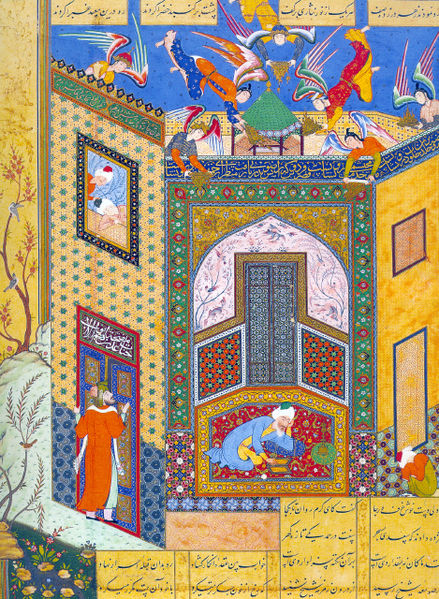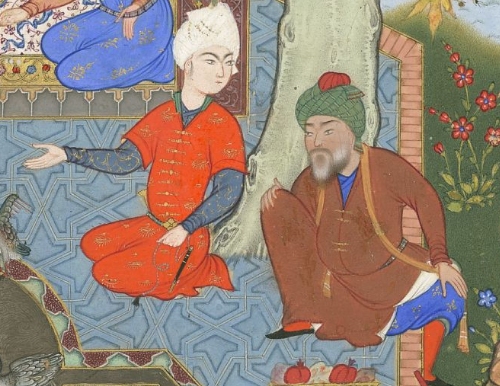<Back to Index>
- Archaeologist Glenn Albert Black, 1900
- Poet Nur ad-Din Abd ar-Rahman Jami, 1414
- Prime Minister of the United Kingdom John Russell, 1792
PAGE SPONSOR


Nur ad-Din Abd ar-Rahman Jami (Persian: نورالدین عبدالرحمن جامی) (August 18, 1414 – November 19, 1492) was one of the greatest Persian poets in the 15th century and one of the last great Sufi poets.
Jami was born in a village near Jam, then Khorasan, now located in Ghor Province of Afghanistan, but a few years after his birth, his family migrated to the cultural city of Herat where he was able to study Peripateticism, mathematics, Arabic literature, natural sciences, and Islamic philosophy at the Nizamiyyah University of Herat.
Because his father was from Dasht, Jami's early pen name was Dashti but later, he chose to use Jami because of the two reasons which he mentioned in a poem:
مولدم جام و رشحهء قلمم
جرعهء جام شیخ الاسلامی است
لاجرم در جریدهء اشعار
به دو معنی تخلصم جامی است
- My birthplace is Jam, and my pen
- Has drunk from (knowledge of) Sheikh-ul-Islam (Ahmad) Jam
- Hence in the books of poetry
- My pen name is Jami for these two reasons.
Afterwards he went to Samarkand, the most important center of scientific studies in the Muslim world and completed his studies there. He was a famous Sufi, and a follower of the Naqshbandi Sufi Order. At the end of his life he was living in Herat. His epitaph reads "When your face is hidden from me, like the moon hidden on a dark night, I shed stars of tears and yet my night remains dark in spite of all those shining stars."
Jami had a brother called Molana Mohammad, who was, apparently a learned man and a master in music, and Jami has a poem lamenting his death. Jami fathered four sons, but three of them died before reaching their first year. The surviving son was called Zia-ol-din Yusef and Jami wrote his Baharestan for this son.
In his role as Sufi shaykh, Jami expounded a number of teachings regarding following the Sufi path. In his view, love for the Prophet Mohammad was the fundamental stepping stone for starting on the spiritual journey. To a student who asked to be his pupil and claimed never to have loved anyone, he said, "Go and love first, then come to me and I will show you the way."
Jami
wrote approximately eighty-seven books and letters, some of which have
been translated into English. His works range from prose to poetry, and
from the mundane to the religious. He has also written works of history
and science. In Herat, his manual of irrigation design included
advanced drawings and calculations and is still a key reference for the
irrigation department. His poetry has been inspired by the ghazals of Hafez, and his Haft Awrang is, by his own admission, influenced by the works of Nezami. Tanam Farsooda jaa para The
poem demonstrates the depth of love Hadrat Maulana Abdur Rahman Jaami
(rahmatullah alayh) had for Sayyiduna Rasulullah صلي الله عليه و سلم
Ze Hijra Ya Rasul Allah
صلي الله عليه و سلم
Dillam Paz Murda Aawara
Ze Isyaa. Ya Rasul Allah صلي الله عليه و سلم!
My body is dissolving in your separation
And my soul is breaking into pieces. Ya Rasul Allah!صلي الله عليه و سلم
Due to my sins, My heart is weak and becoming enticed. Ya Rasul Allah!
صلي الله عليه و سلم
Choon Soo’e Mun Guzar Aari
Manne Miskeen Zanaa Daari
Fida-E-Naqsh-E-Nalainat
Kunam Ja. Ya Rasul Allah!صلي الله عليه و سلم
When you pass by me
Then even in my immense poverty, ecstatically,
I must sacrifice my soul on your blessed sandal. Ya Rasul Allah!صلي الله عليه و سلم
Ze Jaame Hubb To Mustam
Ba Zanjeere To Dil Bustam
Nu’mi Goyam Ke Mun Bustum
Sukun Daa. Ya Rasul Allah صلي الله عليه و سلم!
I am drowned in the taste of your love
And the chain of your love binds my heart.
Yet I don’t say that I know this language (of love). Ya Rasul Allah
صلي الله عليه و سلم!
Ze Kharda Khaish Hairaanam
Siyaa Shud Roze Isyaanam
Pashemaanam, Pashemaanam, Pashemaanam. Ya Rasul Allah صلي الله عليه و سلم!
I am worried due to my misdeeds;
And I feel that my sins have blackened my heart. Ya Rasul Allah!
صلي الله عليه و سلم
I am in distress! I am in distress! I am in distress! Ya Rasul Allah!
صلي الله عليه و سلم
Choon Baazoo’e Shafaa’at Raa
Khushaa’I Bar Gunaagara
Makun Mahruume Jaami Raa
Daraa Aan. Ya Rasul Allah صلي الله عليه و سلم!
Ya Rasul Allah صلي الله عليه و سلم! When you spread your hands to intercede for the sinners,
Then do not deprive Jaami of your exalted intercession.